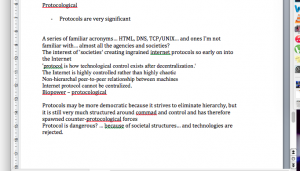I’ll readily admit that this week’s reading ‘How Control Exists after Decentralization‘ went way above and beyond my head. I’ve had the PDF open for several hours and I keep requiring a Tim Tam break away from taking notes that even I’m not sure I can comprehend properly. (I did come across a word—metaphysical—that True Detective’s Rust Cohle used in one of his existential monologues and that was enough to give me an idea of what level this reading was working on). If anything, I think I gather more from the whiteboard digram of hubs and nodes than I do reading about them… damn my need for visual stimuli.

Actual screenshot of the notes I was taking during the reading. You’ll notice the abundance of question marks.
Here’s what I did gather from the reading, though succinct and overly simplified (for now?), hopefully after it’s further discussed in class I’ll have more to work off of.
Beginning with the histories of ‘protocol,’ not within technology but the use of protocols within human society, this understanding helped me identify how protocols can be used in regards to technology and the Internet.
“Protocols may be more democratic because it strives to eliminate hierarchy, but it is still very much structured around command and control and has therefore spawned counter-protocological forces.”
The above quote resonated with me, because I read it in regards to societies rather than explicitly relating it to the Internet. It’s as if the ingrained protocols in societal structures were challenged, those that did the challenging would be rejected.
At first glance the Internet might be seen as chaotic when in fact it is highly controlled. This rings back to a few weeks ago when we were discussing the network dynamics in class and the Internet fell under the ‘bell curve distribution’ which are highly regulated networks.
Throughout the reading I also identified several familiar acronyms that I’ve come across during my browsing and amateur troubleshooting. Acronyms which now I know stand for:
- HTML: Hypertext Markup Language
- DNS: Domain Name System
- TCP/IP: Transmission Control Protocol/Internet Protocol
- UNIX: …now I know it’s not an acronym and just the name of an OS.
More to come on all of this, hopefully I get a stronger grasp on societies in the land of networked media as it goes along.